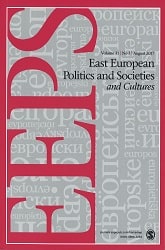Museal Games and Emotional Truths: Creating Polish National Identity at the Warsaw Rising Museum
Museal Games and Emotional Truths: Creating Polish National Identity at the Warsaw Rising Museum
Author(s): Monika Żychlińska, Erica FontanaSubject(s): Museology & Heritage Studies, History of ideas, Fascism, Nazism and WW II, Politics of History/Memory, Politics and Identity
Published by: SAGE Publications Ltd
Keywords: national identity; collective memory; politics of memory; Warsaw Rising Museum; nostalgia;
Summary/Abstract: The Warsaw Rising Museum (WRM), opened in Warsaw in 2004 to commemorate the 1944 rebellion by Polish citizen-soldiers against Nazi occupiers, is considered the first modern historical museum in Poland. During the ten years since its opening, it has had a significant influence not only on public imaginations of the Rising but also subsequent museum trends in Poland. Using Anna Wieczorkiewicz’s concept of the “museal game” in which meaning is produced jointly by the museum institution and its visitors, we address the following questions: what meanings does the WRM have for its various audiences, and how has it come to have these meanings? Drawing on analysis of the museum’s founding documents and press coverage of the museum, interviews with visitors, and a review of scholarly literature, we seek to understand the universe of meanings within which the WRM has become a sociocultural phenomenon. We argue that the strategies employed by the museum encompass interconnected political and poetical dimensions. Specifically, we discuss how the museum attempts to foster Polish national identity by evoking personal identification among visitors by appealing to their emotions. We examine the range of meanings the WRM has been given by various participants in the museal game—museum originators, “public voices” including scholars and journalists, visitors, and ourselves as researchers. In doing so, we give special attention to the notion of nostalgia—how it has been operationalized by the museum planners, and how it is received by the audience, in the service of promoting personal and emotional identification.
Journal: East European Politics and Societies
- Issue Year: 30/2016
- Issue No: 02
- Page Range: 235-269
- Page Count: 35
- Language: English
- Content File-PDF

